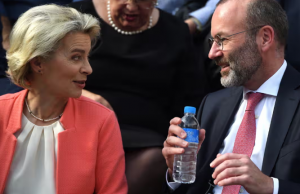he has inspected a drone factory in Latvia, laid flowers at a monument to the late Pope John Paul II in Poland and posed with a shaggy dog in Luxembourg. From Copenhagen to Split, Maastricht to Plovdiv, she has given speeches, shaken hands, signed T-shirts and posed for a lot of selfies. It has been a busy few weeks for Ursula von der Leyen, who is seeking a second five-year term as head of the European Commission, one of the most powerful jobs in European politics.
With cheering activists and campaign “merch” – as team Von der Leyen refers to its royal purple branded mugs and hoodies – it looks like any other drive to get the vote out. There is even a video of the commission president striding purposefully along a lane near her countryside home to dramatic orchestral music. “Campaigning is one of the best things that ever happened to me in my life,” the German politician said at a recent debate with rival candidates.
But this is not a typical campaign. Von der Leyen is not running in the European elections on 6-9 June and almost nobody she meets can vote for her. In 2024 this is what it takes to become president of the commission, the EU’s highly technocratic civil service with political leadership; to secure the keys to the Berlaymont in Brussels, Von der Leyen has to convince two electorates that are notoriously hard to please.
Screenshots of social media image posts, showing VDL with a dog, in a merch hoodie, and at the Champions League final
View image in fullscreen
Some of Ursula von Der Leyen’s social media posts from the campaign trail. Composite: Social media
First she has to be appointed by a qualified majority of the EU’s 27 heads of state and government, with a decision expected at a summit on 27-28 June. Then she has to win a simple majority of the European parliament’s 720 newly elected members. With nationalists and the far right expected to make significant gains, her chances of success in her attempt for a second term are increasingly uncertain.
Von der Leyen’s campaign was really aimed at the European parliament, said Nicolai von Ondarza, the head of research at the German Institute for International and Security Affairs in Berlin. The parliament’s biggest groups, the centre right and the centre left, insist on selecting “lead candidates” to run as commission president, a procedure better known by its German name, the spitzenkandidaten process. Under the system, the group that wins the most votes – which has been Von der Leyen’s centre-right European People’s party (EPP) for the last 25 years – would have its candidate elected commission president. “She’s running her campaign for those in the European parliament who insist on the lead candidate procedure and it will make her uphill struggle to get a majority in the European parliament a tiny bit easier,” Von Ondarza said.
He sees the spitzenkandidaten process as a “charade” because there is no direct link between voting in the European elections and the person who becomes commission president. In 2019 the concept suffered “a mortal blow”, he said, when EU leaders quickly tossed aside the EPP lead candidate, Manfred Weber, choosing an alternative president who had neither campaigned nor publicly expressed interest in the job: Von der Leyen.
Von der Leyen and Manfred Weber at an election rally in Plovdiv, Bulgaria, on Sunday. Photograph: Vassil Donev/EPA
In 2024 even Von der Leyen’s own Christian Democratic Union party was not promoting her campaign much, suggested Von Ondarza. “She tries to travel once to most of the European countries, but there’s no real European campaign, even in Germany,” he said. “She doesn’t figure strongly in the election. If you go through the streets of Berlin, none of the election posters from the CDU will feature Von der Leyen.”
The first woman to lead the commission, Von der Leyen remains the favourite to win a second term. Credited with steering the EU through a global pandemic and a grinding, brutal war on its borders while passing landmark climate legislation, even critics came to admire her. But in recent months her star has fallen. She was accused of overreach with her forthright support for Benjamin Netanyahu’s government in the immediate aftermath of Hamas’s attack last October, when she failed to urge Israel to respect international law in its reprisals.
the Guardian

